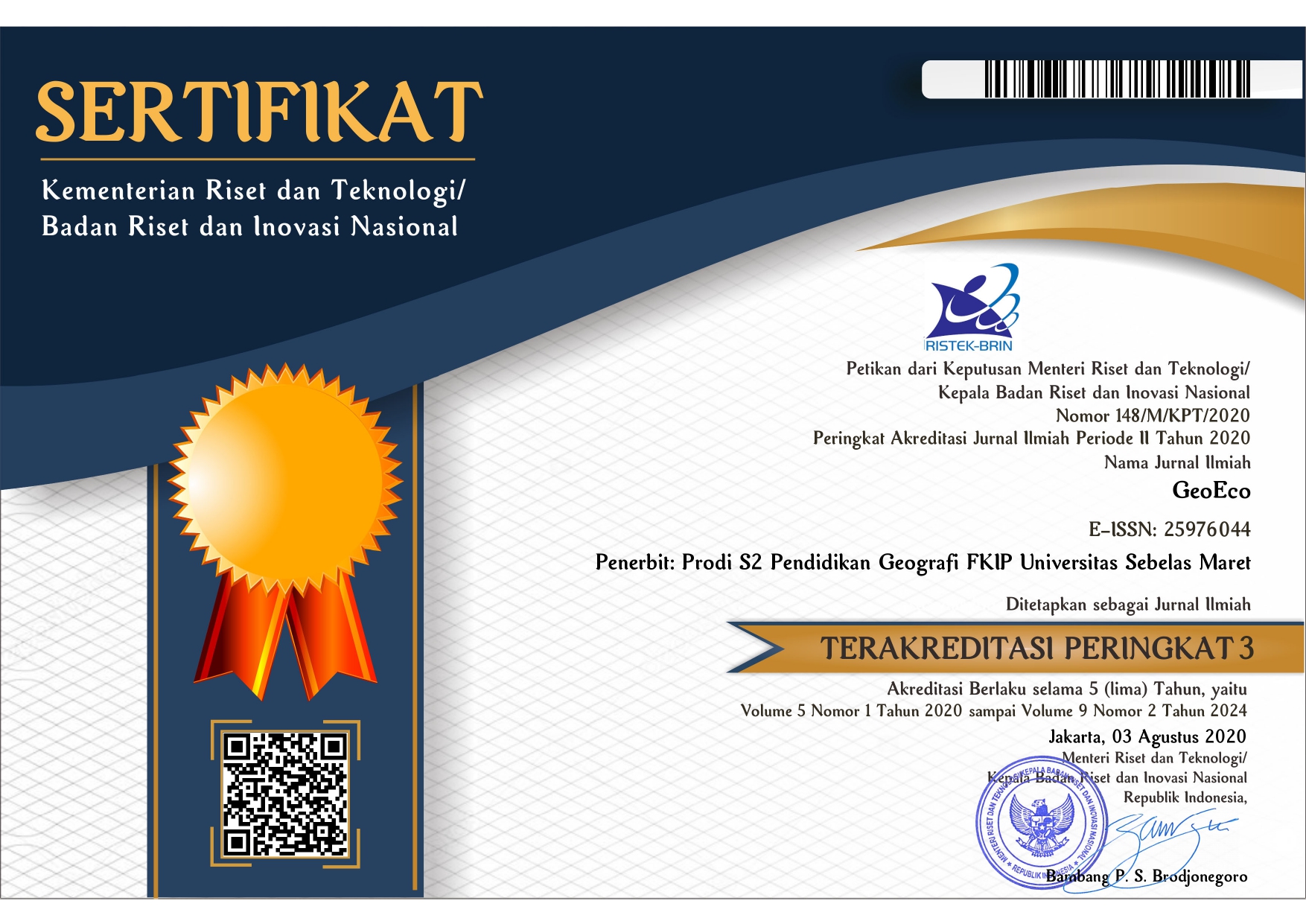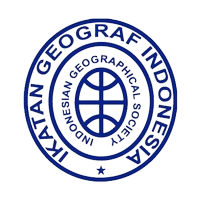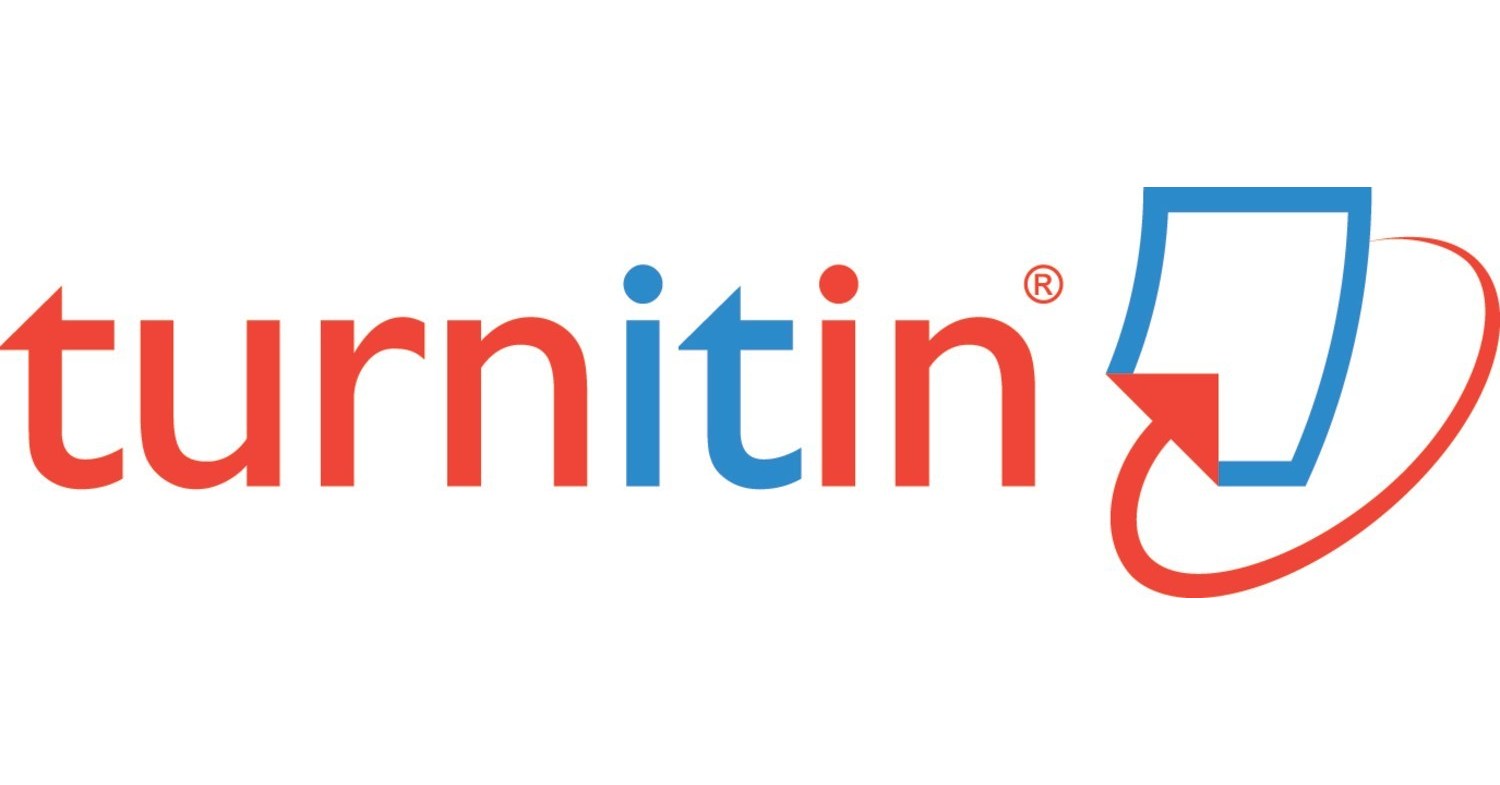DEVELOPMENT OF GIS-BASED LEARNING MULTIMEDIA TO IMPROVE SPATIAL THINKING ABILITY OF SOCIAL STUDENTS IN HIGH SCHOOL
Abstract
Distance learning that occurred during the Covid-19 period caused problems. Learning geography, which should provide a good quality of spatial thinking, finally gets a problem. Multimedia learning is a representation tool needed in online learning. These conditions improve students' spatial thinking skills by applying Geographic Information Systems (GIS). The development of the learning multimedia uses a 4-D (Four-D) product development model consisting of the phases: define, design, development, and dissemination. Assessment parameter evaluation improves students' spatial thinking skills, considering comparing values between the experimental and control classes using the Independent Sample T-test = 0.05. The results of this study are that GIS-based learning multimedia is feasible to use with the validity test and trial being a score of 4 or is effectively used to improve students' spatial thinking skills with the result = 5,850 > T-table (2,035).
Keywords
Full Text:
PDFReferences
Bednarz, Robert S., and Sarah W. Bednarz. 2008. Geospatial Technologies and Homeland Security. 94th ed.
Charcharos, Christos, Eleni Tomai, and Margarita Kokla. 2015. “Assessing Spatial Thinking Ability.” GEOTHNK International Closing Conference (November):151–66. doi: 10.13140/RG.2.1.1621.0962.
Chen, Chih-hung, and Chin-chung Tsai. 2021. “In-Service Teachers ’ Conceptions of Mobile Technology-Integrated Instruction : Tendency towards Student-Centered
Learning.” Computers & Education 170(April):104224. doi: 10.1016/j.compedu.2021.104224.
Conrad, By Kerri. 2000. Instructional Design for Web-Based Training. edited by J. Hiam. Massachusetts: HRD Press.
Harvey, Editor Jen. 1998. Evaluation Cookbook. edited by Jen Harvey. Edinburgh: Learning Technology Dissemination Initiative.
Istifarida, Binti, Sigit Santoso, and Yasin Yusup. 2017. “Pengembangan E-Book Berbasis Problem Based Learning-GIS Untuk Meningkatkan Kecakapan Berpikir Keruangan Pada Siswa Kelas X SMA N 1 Sragen 2016/2017.” GeoEco 3:133–44. doi: ttps://doi.org/10.20961/paedagogia.v20i2.8596.
Jahnke, Isa, and Julia Liebscher. 2020. “Three Types of Integrated Course Designs for Using Mobile Technologies to Support Creativity in Higher Education.” 146(December 2019).
Jo, Injeong, and Sarah Witham Bednarz. 2009a. “Evaluating Geography Textbook Questions from a Spatial Perspective : Using Concepts of Space , Tools of Representation , and Cognitive Processes to Evaluate Spatiality Evaluating Geography Textbook Questions from a Spatial Perspective : Using Concepts Of.” Journal of Geography 1:4–13. doi: 10.1080/00221340902758401.
Jo, Injeong, and Sarah Witham Bednarz. 2009b. “Evaluating Geography Textbook Questions from a Spatial Perspective: Using Concepts of Space, Tools of Representation, and Cognitive Processes to Evaluate Spatiality.” Journal of Geography 108(1):4–13. doi: 10.1080/00221340902758401.
Jo, Injeong, Jung Eun Hong, and Kanika Verma. 2016. “Facilitating Spatial Thinking in World Geography Using Web-Based GIS.” Journal of Geography in Higher Education 40(3):442–59. doi: 10.1080/03098265.2016.1150439.
Leal Filho, Walter, and Paul Pace. 2016. “Teaching Education for Sustainable Development at University Level.” World Sustainability Series 1–6. doi: 10.1007/978- 3-319-32928-4_1.
McAlpine, Lynn, and Cynthia Weston. 1994. “The Attributes Of Instructional Materials.” Performance Improvement Quarterly 7:19–30. doi: 10.1111/j.1937- 8327.1994.tb00614.x.
Metoyer. SK, SW Bednarz, RS Bednarz. 2015. “Geospatial Technologies and Geography Education in a Changing World: Geospatial Practices and Lessons Learned.” Geospatial Technologies and Geography Education in a Changing World: Geospatial Practices and Lessons Learned 21–33. doi: 10.1007/978-4-431-55519-3.
Mishra, Dr. Lokanath, Dr. Tushar Gupta, and Dr. Abha Shree. 2020. “Online Teaching- Learning in Higher Education during Lockdown Period of COVID-19 Pandemic.” International Journal of Educational Research Open 100012. doi: 10.1016/j.ijedro.2020.100012.
Mkhongi, Felicity Aphiwe., and Walter Musakwa. 2020. “Education Sciences Perspectives of GIS Education in High Schools : An Evaluation of UMgungundlovu District ,.” Education Sciences 10:1–15. doi: https://doi.org/10.3390/educsci10050131.
National Research Association. 2006. Learning to Think Spatially. Washington DC: The National Academies Press.
Nugroho, Eko. 2008. Pengenalan Teori Warna. 1st ed. Yogyakarta: ANDI OFFSET. Scholz, Michael A., Niem Tu Huynh, Carmen P. Brysch, and Ruojing Wang Scholz. 2014.
Scholz, Michael A., Niem Tu Huynh, Carmen P. Brysch, and Ruojing Wang Scholz. 2014. “An Evaluation of University World Geography Textbook Questions for Components of Spatial Thinking.” Journal of Geography 113(5):208–19. doi: 10.1080/00221341.2013.872692.
Singh, Soon Singh Bikar, Grant Kleeman, and Penny Van Bergen. 2012. “Opportunities to Implement GIS in Teaching and Learning Geography: A Survey Among Smart Schools in Sabah, Malaysia.” Procedia - Social and Behavioral Sciences 69(Iceepsy):884–89. doi: 10.1016/j.sbspro.2012.12.012.
Stoller, James K. 2020. “A Perspective on the Educational ‘SWOT’ of the Coronavirus Pandemic.” Chest (October):1–6. doi: 10.1016/j.chest.2020.09.087.
Thiagarajan, Sivasailam, Dorothy Semmel, G. Semmel, and Melvyin I. 1974. “Instructional Development for Training Teachers of Exceptional Children: A Sourcebook.” Journal of School Psychology 14(1):75. doi: 10.1016/0022-4405(76)90066-2.
Wegener, Debby R. 2022. “Information Literacy: Making Asynchronous Learning More Effective With Best Practices That Include Humor.” Journal of Academic Librarianship 48(1):102482. doi: 10.1016/j.acalib.2021.102482.
Yau, Alice Hoi Ying, M. W. L. Yeung, and C. Y. P. Lee. 2022. “A Co-Orientation Analysis of Teachers’ and Students’ Perceptions of Online Teaching and Learning in Hong Kong Higher Education during the COVID-19 Pandemic.” Studies in Educational Evaluation 72(December 2021):101128. doi: 10.1016/j.stueduc.2022.101128.
Yuan, Yun-peng, Garry Wei-han Tan, Keng-boon Ooi, and Wei-lee Lim. 2021. “Telematics and Informatics Can COVID-19 Pandemic Influence Experience Response in Mobile Learning ?” Telematics and Informatics 64(April):101676. doi: 10.1016/j.tele.2021.101676.
Zhao, Ling, Cuicui Cao, Yuni Li, and Yuan Li. 2022. “Determinants of the Digital Outcome Divide in E-Learning between Rural and Urban Students: Empirical Evidence from the COVID-19 Pandemic Based on Capital Theory.” Computers in Human Behavior 130(December 2021):107177. doi: 10.1016/j.chb.2021.107177.
Refbacks
- There are currently no refbacks.












.png)

